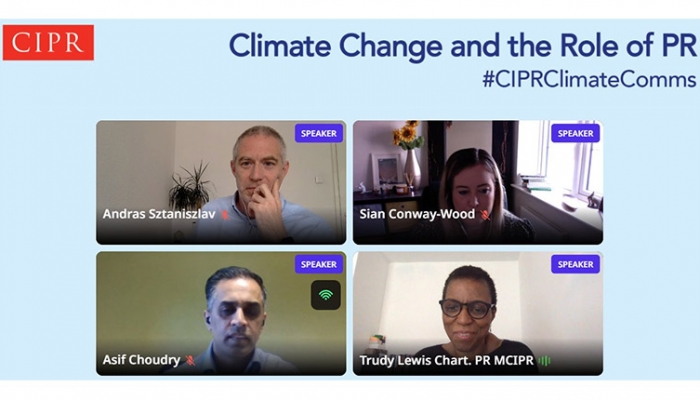‘You have a direct role to play’ – CIPR’s Climate Change and the Role of PR conference
This morning’s sessions for CIPR’s half-day conference on climate change offered advice and solutions for PR practitioners to lead on sustainable practices and strategy – something posed as a challenge, an opportunity, but also a responsibility for the sector.
Following an introduction from CIPR president Mandy Pearse, event chair Trudy Lewis led attendees through panels, presentations and discussion including Climate Group’s director of internal communications Luke Herbert on ‘How comms professionals can save the planet’ and A Plastic Planet’s co-founder Sian Sutherland sharing ‘Truth, responsibility, opportunity, risk, legacy – 5 words in 15 minutes to sum up the importance of the plastic crisis for every business’.
The role of comms professionals on pushing forward with awareness, education and action was underlined throughout the morning, with great importance placed on true engagement and interest versus surface-level messaging for profit.
‘For comms professionals, there’s so much uncertainty on how climate measures will take place, but the pathway is very clear,’ said Luke.
PR communicators have ‘one foot in our organisations and one foot in the world – you’re ideally placed on this issue. You have a direct role to play’.
Sian underlined the responsibility of comms and PR: ‘The myths and the facts are all our responsibility and we need to start telling the truth’.
On the plastic crisis, Sian shared facts not widely featured in the narrative being shared regarding climate change, that considerations of plastic’s impact on soil is often ignored in favour of concern for our oceans, and that recycling is not a cure-all, despite reliance on it as a sign of engagement in environmental issues. ‘We down-cycle plastic,’ said Sian. ‘There are no recycling fairies’.
Action alongside education is what Sian advocated for in the industry, using examples of The Plastic Planet’s ‘Sack the sample sachet’ campaign and work with Kraft Heinz.
‘It’s a failing to believe that words = action if there are no consequences,’ said Sian.
‘The pandemic has created a line – there are businesses that will step across this line… and those that won’t. They will be our future dinosaurs’.
On moving forward with action and education – advising clients to ‘go green’ – speakers Sian Conway-Wood of #EthicalHour, CommsHero’s Asif Choudry and PersonaR & WhiteElephantDigital’s Andras Sztaniszlav were ready with answers.
The first step – understanding what ‘greenwashing’ is, and how to avoid it. According to Sian Conway-Wood:
‘We’re all being greenwashed from all angles. There are companies that are doing this intentionally, and the small businesses that just don’t know any better. But we can be the gatekeepers.’
Personal, as well as professional, integrity was urged by Andras: ‘There are people that are very good at influencing, but don’t live sustainably. Authenticity needs to be considered when we talk about the responsibility of PR professionals.’
For Asif, sustainability should be part of a creative agency’s resources for clients. Making any paper used FSC-certified, making sure clients are aware that this is possible and available to them. ‘People aren’t aware that these things exist,’ shared Asif. ‘We let our clients know as an active marketing drive’.
That there is a strong business case for ESG planning and strategy, alongside the ethical concerns, is something that shouldn’t be ignored by any individual or organisation within the comms sector.
‘It’s not just about risk management; the ‘doom and gloom’,’ said Sian. ‘It’s becoming more and more of a consumer demand. Education is happening and awareness is growing – the way to be profitable is to be sustainable.
’We all know the reports, we all use the phrase climate emergency, but they can make people put their heads in the sand. That’s the same with consumers – people just don’t want to hear it.
‘We need to use our comms skills. The good news is, we’re all here, we can do that!’
Andras pointed out the changed role of PR, from ‘painting better pictures’ for companies and clients, to being part of strategy, with a seat of the boardroom, to becoming a key part of operations.
Asif summed up the mix of personal with corporate responsibility, and how vital PR will be for communicating importance, intent and plans for action on climate change and environmental responsibility:
‘People have to want to do it. You have to keep going, it’s not a subject you can get bored of. There’s going to be costs involved, you have to reinvest profits and revenue.
‘Above all, you’re doing it because it’s the right thing to do’.
Find out more about CIPR’s Climate Change and the Role of PR conference as well as the speakers and topics being cover on the website.
Looking for more on ESG? Download our report The ESG opportunity for PR and check out five reasons why ESG needs to be part of your planning this year.





Leave a Comment